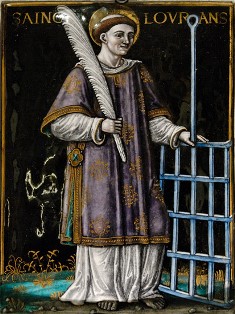 St. Ambrose of Milan (+397) in his work De officiis ministrorum, echoing Cicero, spoke about martyrs. He lingers over the conversation between St. Pope Sixtus II (whose feast we had the other day) and his great deacon, the Spanish born – but by adoption Roman – St. Lawrence, who died this day in 258 on the Via Tiburina.
St. Ambrose of Milan (+397) in his work De officiis ministrorum, echoing Cicero, spoke about martyrs. He lingers over the conversation between St. Pope Sixtus II (whose feast we had the other day) and his great deacon, the Spanish born – but by adoption Roman – St. Lawrence, who died this day in 258 on the Via Tiburina.
1.41.204. What is to be said about little children of two years who obtained the palm of victory before they had any awareness of what was going on around them? And what is to be said of Saint Agnes? Exposed to the danger of losing the two most precious goods, chastity and life, she defended chastity and exchanged life for immortality.
205. We cannot pass over Saint Lawrence, who, seeing his bishop Sixtus being led to martyrdom began to weep, not because he was being led away to die, but because he would have to outlive him. He began, therefore, to shout loudly, “Where are you going, Father, without your son? Where are you hurrying off to, O holy bishop, without your deacon? You never offered the Sacrifice without your minister. What about me has displeased you, O Father? Perhaps you have found me to be unworthy? At least reconsider whether you chose a suitable minister. Do you not want him to whom you entrusted the Blood of the Lord to shed with you his own blood, whom you caused to participate in the sacred mysteries? Be careful that while your fortitude is being praised, your judgment doesn’t waver. The ridicule of a student is a bad mark for the teacher. It is necessary to remember that great and famous men are victorious through the victorious examples of their students even more than by their own. After all, Abraham offered his own son, Peter sent Stephen before him. O Father, let you also show forth your virtue in the person of your son. Offer up the one you instructed, so as to reach the eternal prize in the glorious company, safe and sure of your justice.”
206. And Sixtus replied to him: “I am not leaving you, O my son, I am not abandoning you; but even greater trials are reserved for you. Because we are old an easier track to the contest was allotted; Because you are young, for you there is fated a more glorious triumph over tyranny. You will be coming shortly, so cease your weeping: you’ll follow me within three days. It is fitting that there be this interval between a bishop and a levite. It would not be worthy for you to come through to victory under the guide of your master, as if you were looking for help. Why are you asking to share in my martyrdom? I am leaving you my entire inheritance. Why are you requiring that I be present? Students who are still weak are going before their master, and those now strong, who do not have need for any more instruction are following him in order to win through without him. In such a way Elijah left behind Elisha. I am entrusting to you the inheritance of my virtue.”
207. There was a contest between them, a truly worthy contest to be fought out by a bishop and a deacon: who would be the first to suffer for Christ? They say that in the performances of tragic plays the audience would burst out in great applause when Pylades said he was Orestes and Orestes, as he indeed was, affirmed that he was Orestes: Pylades who was to be killed in Orestes place, Orestes in order to prevent Pylades from being him in his stead. But both of them shouldn’t have been allowed to live since they were guilty of the crimes of parricide: the one because he truly committed the crime and the other because he was an accomplice. In our situation, on the other hand, Saint Lawrence was driven by no other desire that to immolate himself for the Lord. Three days later, while mocking the tyrant he was burned on a grate: “This side’s done,” he said, “turn me over and have a bite.” [“Assum est, inquit, versa et manduca.”] And so it was that he bested the heat of the flames with the might of his spirit.


































I was thinking about this post in the car last night. How many people are now so eager to receive the palm of victory?
True, the circumstances are not the same these days for most Christians and aren’t likely to have a chance at martyrdom, but if we had the chance, would we triumph or would we fail?